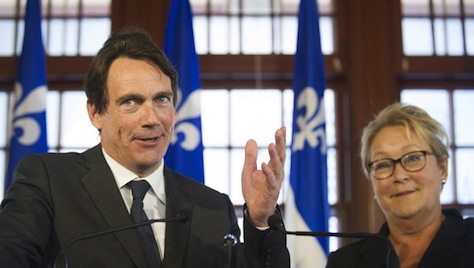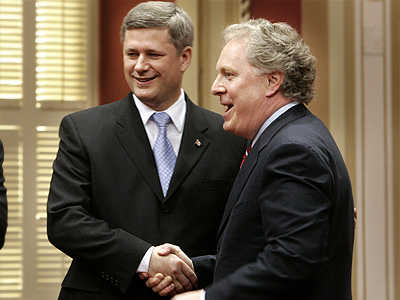One month ago, on the popularity of premier Pauline Marois’s push to enact a ‘secular charter of values’ (la charte de la laïcité) that would ban the wearing of religious symbols, including the Muslim hijab, it seemed like the sovereigntist Parti québécois (PQ) was headed for a huge victory on the basis of ‘cultural’ values that, for once, had little to do with Québec independence or with the status of the French language in the province. ![]()
![]()
Two weeks ago, that conventional wisdom was upended, as the PQ’s star candidate Pierre Karl Péladeau and Marois spent days speculating about a potential independence referendum and how Québec might separate from Canada and still retain the Canadian dollar and open borders with the rest of Canada. The sudden return of the independence debate to the campaign agenda seemed to scare many votes into the arms of Philippe Couillard, the new leader of the Parti libéral du Québec (Liberal Party, or PLQ), which has been out of power for barely 18 months after nearly a decade in power.
Now, after the final debate among the four main party leaders last week, Couillard’s comments in defense of bilingualism have shifted the debate once again to yet another controversial issue — the proper role of the provincial government in promoting French and/or English within Québec.
Last Thursday night’s debate was vastly different from the previous debate. Whereas Marois took much of the heat in the first debate, Couillard received more criticism in the much feistier final debate — likely because polls increasingly show that the Liberals have not only recaptured the lead from the PQ, but that it could win a majority government.
Amid all the sniping, however, Couillard’s comments about bilingualism stand out:
“Bilingualism isn’t a threat,” he said. “Knowledge of English is indispensable.”
To American ears — or, possibly, to Ontarian or British Columbian or Albertan ears — that shouldn’t be controversial. But in many regards, the French language debate is even more fraught than the referendum debate, because it’s not as hypothetical as an independent Québec.
The province’s 8 million citizens comprise a tiny island of French speakers within a sea of 341 million (mostly) English speakers in the United States and Canada. Without the Québec government’s interest in protecting the French language, English might easily overrun French as the language of Québec commerce and industry, putting the province’s native French speakers at a disadvantage in North America’s French-speaking heartland.
Continue reading Will bilingualism doom the Liberals in Québec?


